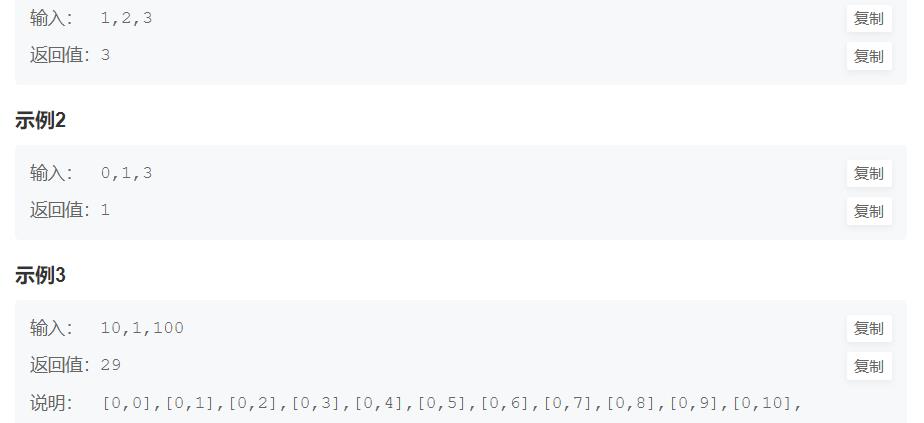牛客剑指offer 机器人的运动范围
Posted *^O^*—*^O^*
tags:
篇首语:本文由小常识网(cha138.com)小编为大家整理,主要介绍了牛客剑指offer 机器人的运动范围相关的知识,希望对你有一定的参考价值。
题目描述
地上有一个rows行和cols列的方格。坐标从 [0,0] 到 [rows-1,cols-1]。一个机器人从坐标0,0的格子开始移动,每一次只能向左,右,上,下四个方向移动一格,但是不能进入行坐标和列坐标的数位之和大于threshold的格子。 例如,当threshold为18时,机器人能够进入方格[35,37],因为3+5+3+7 = 18。但是,它不能进入方格[35,38],因为3+5+3+8 = 19。请问该机器人能够达到多少个格子?
范围:
1 <= rows, cols<= 100
0 <= threshold <= 20

解题思路
需要采取搜索策略,这里我采用的是深度搜索,从第一个位置出发,只要是符合的且能够到达的,就加入,为了防止重复加入的位置出现,需要再来一个一样的二维数组来存放标志位,只要访问过了就需要改变标志位。
代码示例
public class Solution {
public int movingCount(int threshold, int rows, int cols) {
//临时变量visited记录格子是否被访问过
boolean[][] visited = new boolean[rows][cols];
return dfs(0, 0, rows, cols, threshold, visited);
}
public int dfs(int i, int j, int rows, int cols, int threshold, boolean[][] visited) {
//i >= rows || j >= cols是边界条件的判断,threshold < sum(i, j)判断当前格子坐标是否
// 满足条件,visited[i][j]判断这个格子是否被访问过
if (i >= rows || j >= cols || threshold < sum(i, j) || visited[i][j])
return 0;
//标注这个格子被访问过
visited[i][j] = true;
//沿着当前格子的右边和下边继续访问
return 1 + dfs(i + 1, j, rows, cols, threshold, visited) +
dfs(i, j + 1, rows, cols, threshold, visited);
}
//计算两个坐标数字的和
private int sum(int i, int j) {
int sum = 0;
//计算坐标i所有数字的和
while (i != 0) {
sum += i % 10;
i /= 10;
}
//计算坐标j所有数字的和
while (j != 0) {
sum += j % 10;
j /= 10;
}
return sum;
}
}
以上是关于牛客剑指offer 机器人的运动范围的主要内容,如果未能解决你的问题,请参考以下文章